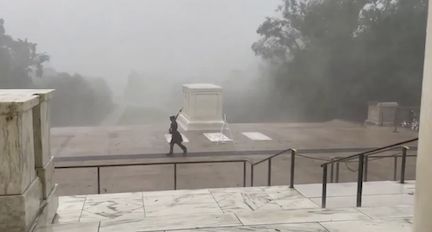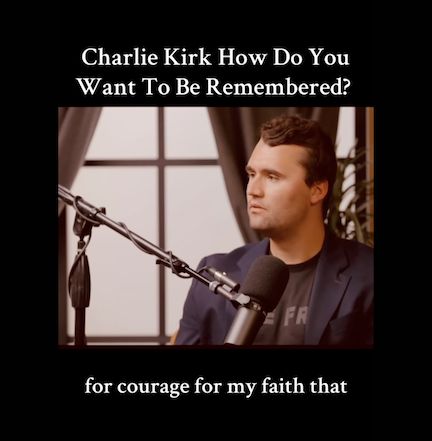Step Out of Line
PEOPLE Magazine relays the details of the Emmy Award acceptance speech of actress Alex Borstein in 2019 as she paid homage to her grandmother "who barely survived the Holocaust.":
Alex Borstein took home the Emmy for Supporting Actress in a Comedy Series ... Borstein paid respect to her grandmother, who barely survived the Holocaust. "I want to dedicate this to the strength of a woman ... She was in line to be shot into a pit and she said, 'What happens if I step out of line?' .... And he said, 'I don't have the heart to shoot you but somebody will.' ... And she stepped out of line." ... Because of her grandmother's decision, she is here and her children are here, she said. "So, step out of line, ladies," she said. "Step out of line."

For video of the speech, click here and navigate to minute 2:10.
While the emphasis of her speech was decidedly to encourage women, specifically, to be brave, to be bold, the story is universal in its application.
There will be times in life when our backs are up against the wall (or our feet are at the edge of a pit with a gun pressed to our back). In those moments, don't let the world and its values (or lack thereof) run roughshod over you. Don't cower before those who persecute, abuse, or bully you.
Be bold. Be brave. Dare to "step out of line."
"Even though I walk through the valley of the shadow of death, I will fear no evil, for you are with me; your rod and your staff, they comfort me" (Psalm 23:4, ESV).
"For God gave us a spirit not of fear but of power and love and self-control" (2 Corinthians 1:7, ESV).
What Do You Want To Be Remembered For?
On September 10, 2025, a prominent voice in the American conservative movement was silenced by an assasin's bullet. Charlie Kirk was the founder and driving voice behind TPUSA (Turning Point, USA), a nonprofit organization that promotes conservative values like free markets, limited government, traditional family, and love of God and country on high school and college campuses.
This wasn't the first time Kirk faced the threat of death, but it was ultimately the last (both literally and spiritually).
He had spoken to massive audiences on the world stage. He had become a friend and a confidante of some of the most powerful people in the US and around the world. He had grown a grassroots movement from a partnership with a handful of high school buddies to an international ministry with thousands of chapters on campuses both here and abroad. He is credited with having made the single greatest contribution for drawing young people into the conservative movement in modern history. He was a political powerhouse, a minister of the Gospel, a highly successful entrepeneur, a husband, and a father. And he accomplished it all before he even celebrated his 32nd birthday. He was, if nothing else, a classic over-achiever.
Yet when asked what he would most want to be remembered for, Kirk simply said ...
"I want to be remembered for courage for my faith. That would be the most important thing; [the] most important thing is my faith."
Whether you agree with some, all, or none of his talking points, we can all agree that it takes courage to speak what we believe and to stand on and for our conviictions.
You may not have a platform like Charlie Kirk's. You may not even like Charlie Kirk. But it's well worth asking yourself, "What do you most want to be remembered for?"
Do you share his heart to be remembered for the courage to boldly live and share your faith?
“If the world hates you, know that it has hated me before it hated you (John 15:18, ESV). "Indeed, all who desire to live a godly life in Christ Jesus will be persecuted" (2 Timothy 3:12, ESV). "But take heart! I have overcome the world" (John 16:33, ESV).
Speak boldly Christian! Cower not!
“Blessed are those who are persecuted for righteousness' sake, for theirs is the kingdom of heaven" (Matthew 5:10, ESV).
We Guard What We Cherish
Every day, 24 hours a day, since the 1930s, the sentries of the Tomb of the Unknown Soldier at Arlington National Cemetary (badgeholders, as they are called) have honored their command to protect and defend that tomb. Regardless of circumstances, they have been ordered to hold their watch, and never abandon their post. Yet, on September 19, 2003, as Hurricane Isabel barraged the Nation's Capital with driving rain and nearly 100mph winds, the sentitels charged with guarding that sacred space were granted permission, for the first time in its history, to stand down to seek shelter.Yet that was not a permission they were willing to act on. NBC news reported at that time:
“They told us that. But that’s not what’s going to happen,” said Sgt. Christopher Holmes, standing vigil on overnight duty. “That’s never an option for us. It went in one ear and right out the other.” ...
With the fierce storm bearing down Thursday night, cemetery officials decided to let the guards move indoors if they felt they were in danger. Cemetery Superintendent John Metzler said he believed it was the first time they have been allowed to do so.
“We certainly didn’t want to put these guards in jeopardy unnecessarily,” Metzler said. ...
Holmes’ group was on duty for 24 hours, from 6 a.m. Thursday until 6 a.m. Friday. They took turns patrolling the tomb in hourly shifts. ...
“Once you become a badgeholder, it’s like you’ll do whatever you have to do to guard the unknowns,” [Staff Sgt. Alfred] Lanier said. “For one, it’s my job. And for two, that’s just how much respect I myself have for the unknowns. That’s just something we cherish.”

Famed Christian author and speaker, Dennis Rainey, had this to add:
In 2003, Hurricane Isabel slammed into the East Coast of the United States, lashing North Carolina and Virginia, then moving northward all the way to Canada, leaving 16 dead and cutting power to six million homes. The edges of the hurricane passed through Washington, D.C., prompting the president and members of Congress to find safer quarters.
That was not the case at Arlington National Cemetery, where guards have relentlessly stood vigil at the Tomb of the Unknowns every hour of every day since July 1, 1937. When the hurricane hit, the soldiers remained at their posts even though they were given permission to seek shelter.
That’s what a soldier does. He acknowledges the storm, but he doesn’t give in to it. He stands firm. As a friend told me, 'If these men can stand guard over the dead, how much more important is it that I stand guard over the living—my wife and children?'
Like these soldiers, we are called to stand and do our duty while staring down the very storms that seek to rob us of courage, taunting and tempting us to neglect our duty and abandon our posts. ...
We ALL have an obligation to stand firm in the storms of life. Yet how much greater is that obligation for husbands and fathers to stand guard over the welfare (physical, spiritual, and emotional) of their families, and for pastors and shepherds to stand guard over the welfare of their flocks?!
As Rainey's friend so aptly said, 'If these men can stand guard over the dead, how much more important is it that I stand guard over the living—my wife and children?' And indeed, pastors, of your congregations.
As Sgt. Lanier suggested, we guard what "we cherish."
"Therefore take up the whole armor of God, that you may be able to withstand in the evil day, and having done all, to stand firm" (Ephesians 6:13).
As faithful followers of Christ, and as Christian leaders — husbands, fathers, shepherds, we must:
1. KNOW OUR COMMANDER ... HIS PERSON AND WORK
"For there is one God, and there is one mediator between God and men, the man Christ Jesus" (1 Timothy 2:5, ESV).
2. KNOW OUR ASSIGNMENT FROM THE MASTER
"So I exhort the elders among you, as a fellow elder and a witness of the sufferings of Christ, as well as a partaker in the glory that is going to be revealed: shepherd the flock of God that is among you, exercising oversight, not under compulsion, but willingly, as God would have you; not for shameful gain, but eagerly; not domineering over those in your charge, but being examples to the flock. And when the chief Shepherd appears, you will receive the unfading crown of glory" (1 Peter5:1-4, ESV).
3. BE FAITHFUL TO BOLDLY STAND OUR GROUND FOR CHRIST ... AGAINST ALL ODDS.
"Be watchful, stand firm in the faith, act like men, be strong" (1 Corinthians 16:13, ESV).
